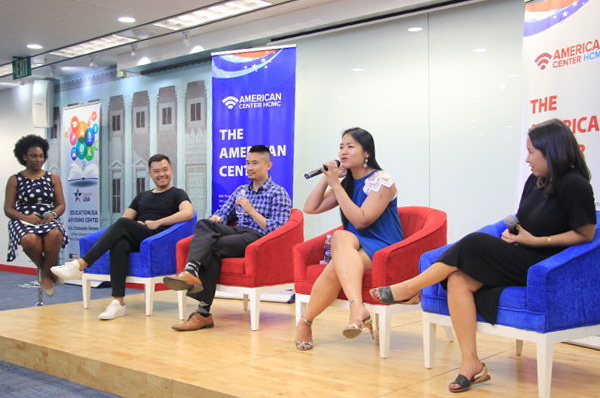Cultural differences can be an issue for Vietnamese families living overseas, and young Vietnamese are turning to the Vietnamese language as a way to bridge that divide.
Speaking at an exchange titled “Then-Now: Navigating the Generation Gap in Vietnamese Culture” on Wednesday, a number of Vietnamese-Americans living in Ho Chi Minh City discussed cross-generational communication in both the Vietnamese and American cultural contexts.
The exchange is part of a series of talks themed “Saigon Dep Lam” (Beautiful Saigon) held by the U.S Consulate General in Ho Chi Minh City at the American Center in district 1, which kicked off May 10.
The series seeks to bridge the gap between Vietnamese in Vietnam and Vietnamese in the U.S.
Speakers at the exchange included filmmaker Jenni Trang Le, U.S. Consulate officer Khanh Nguyen, educator Melinh Rozen, and attorney Khanh Nguyen.
According to them, returning to Vietnam and learning about the country by themselves has brought interesting experiences beyond what they could have anticipated while still in the U.S.
However, along with discovery came severe culture shock.
For Melinh Rozen, seeing friends and peers over the age of 20 living under the same roof as their extended families and living a life ‘managed’ by parents and grandparents was unimaginable.
That’s not what happens in the U.S, she said.

Vietnamese – American speakers talk to listeners at Ho Chi Minh City’s American Center on May 17, 2017. Photo: Dong Nguyen/ Tuoi Tre News
Lucky for learning Vietnamese
Most of the speakers agreed that being able to use Vietnamese has made their life significantly easier, though they didn’t realize the future benefits when their parents forced them to learn the language.
Attorney Khanh Nguyen recalled that he was brought up to be culturally American in an area of North Carolina with few Vietnamese families.
But his parents didn’t support that.
“My sisters and I constantly spoke English at home and my parents hated that”, Khanh laughed. “They even made us eat chili pepper when we spoke English in the house.”
“When I was young, I felt terrible because I wanted to live an American lifestyle and kept wondering why our parents didn’t want us to,” he added.
Things became clearer to Khanh after he returned to Vietnam and became a lawyer, a career choice where having a background of Vietnamese language was a huge asset.
“Thinking back, I feel blessed”, Khanh expressed.
Khanh Nguyen from the U.S. Consulate had the same questions when he was younger of why his parents sent him to Vietnamese classes, took him to pagodas every Sunday, and wanted him to remain true to traditional Vietnamese values.
“When I returned to Vietnam, I felt lucky that my parents wanted me to learn Vietnamese and keep those traditional values”, he said with emotion.

L to R: Alena Joseph (Information Officer, U.S. Consulate General Ho Chi Minh City), attorney Khanh Nguyen, U.S. Consulate officer Khanh Nguyen, filmmaker Jenni Trang Le and educator Melinh Rozen pose for a picture at the end of the talk. Photo: Dong Nguyen/ Tuoi Tre News
Family thing
Vietnamese language and culture is not only a helpful career tool, but also a way for Viet Kieu (overseas Vietnamese) to connect with family, according to the speakers.
Jenni didn’t hesitate to admit that she had opportunities to practice the “nhậu” (drinking) culture and learned some jokes of Vietnamese people during her time in Vietnam, so that she can sit down and drink some bottles of beers with her older uncles and aunts when she returns to the U.S.
Those bonding opportunities gave Jenni and her relatives an opportunity to discuss issues they had never really been brought up.
Sharing with listeners at the American Center, Jenni also revealed her plan to convince her mother to move to Vietnam and live with her here.
The discussion led Melinh Rozen to the realization that her mother was not the “crazy woman” as she once thought, but an ordinary mom who has always cared for her child with all her heart.
Melinh remembered how she felt strange when her mother asked her certain questions that Americans rarely ask, but after coming to Vietnam, she realized that’s how Vietnamese people express their love.





















































